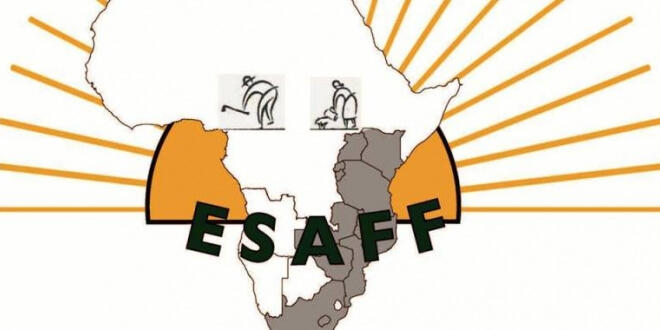
Our Projects are
Transforming African Trade
Quick Contacts
2nd Floor, Fidelity Insurance Centre Waiyaki Way, Westlands

THE Eastern and Southern Africa small-scale Farmers Forum (ESAFF) convened a meeting recently which brought together stakeholders from the private sector and government to discuss the Southern African Development Community (SADC) vision 2050 and the Regional Indicative Strategic Development Plan (RISDP) 2020–2030.
Participants to the conference which was themed: “Tanzania Awareness National Dialogue on the new SADC Vision 2050 and RISDP 2020-2030” came up with a number of policy recommendations geared to ensure successful implementation of the agreed development plans.
The virtual meeting was supported by Southern Africa Trust (SAT) and German Corporation for International Cooperation (GIZ).
They suggested for SADC member states to speed up ratification and domestication of all SADC protocols and programmes at the national level including the SADC Development Fund and SADC Agriculture Development Funds.
Stakeholders also advised the government through the Ministry of Foreign Affairs and East African Cooperation to fast track the formation of the Tanzania SADC National Committee (SNC) as well as ensure fully participation of Non-State Actors (NSA) including the private sector, civil society organizations, farmer organizations and the media in the national and regional development agenda.
On the RISDP 2020-2030, they suggested that SADC member states including Tanzania recognize and domesticate the United Nations Decade of Family Farming (UNDFF) 2019-2028 which aims to shed new light on the important role family farmers play in eradicating hunger.
Governments to increase joint trading by ensuring every member state identifies products of its comparative advantage to trade within the block.
The stakeholders pushed for harmonization of Sanitary and Phytosanitary guidelines to avoid disqualification of agricultural products among members from one country to another and to have a tool for monitoring the non-tariff barriers among member states.
The RISDP 2020–2030 was approved by the SADC Summit of Heads of State and Government in August, 2020.
Frank Dafa from the Confederation of Tanzania Industries (CTI) urged the government to continue improving the country’s business and investment environment.
Audax Rukonge from the Agricultural Non State Actors Forum (ANSAF) underscored the need to formalize the underlined development plans and policies, and facilitate its implementation by member states. He said the policies to be looked at include those indicating scrapping of various taxes which are a challenge to investors in the agriculture sector.
“There is a need for member states to start implementing the Maputo Declaration on Agriculture and Food Security which calls for governments to allocate at least 10 percent,” said Rukonge noting its implantation would enhance productivity in the sector.
Executive Director of Forum CC, Rebbeca Muna underscored the need to heavily invest in research to achieve the targeted goals.
Eng Caroline Valerian from the Ministry of Industry and Trade said the government will continue to improve the business environment as well as enhancing productivity of food products.
Dynes Mtei from the Ministry of Agriculture said the government through the Agricultural Sector Development Programme (ASDP II) is working towards implementation of SADC development plan which includes ensuring full participation of stakeholders including farmers.
ESAFF Coordinator, Joe Mzinga said: “We organised the meeting to bring together stakeholders so that they discuss and deliberate on the various issues highlighted in the SADC Vision 2050 and RISDP 2020-2030.”
Under the Industrial Development and Market Integration 2050, SADC is to be an industrialized and integrated region, where citizens equitably benefit from opportunities of a stable regional market that is commensurate with the AU’s Accelerated Industrial Development for Africa (AIDA), Science, Technology, and Innovation Strategy for Africa (STISA), African Mining Vision (AMV), Boosting Intra-African Trade (BIAT), and Comprehensive Africa Agriculture Development Programme (CAADP); and is well integrated into the broader African Continental Free Trade Area (AfCFTA).
The 2050 Infrastructure Development in Support of Regional Integration intends to ensure the region has an efficient and effective technologically-driven cross-border infrastructure services and networks to support and facilitate deeper regional integration.
On social and human capital development, SADC will by 2050 ensure a high quality of life, in which its citizens are well educated and healthy.
The strong and inclusive human capital base will enable SADC citizens to play a pivotal role in the region’s socio-economic development, through enhanced productivity.
Non-State Actors present at the meeting under the umbrella organizations—Tanzania Private Sector Foundation (TPSF) and CTI.
Others are the Tanzania Chamber of Commerce, Industry and Agriculture (TCCIA), civil society organisations led by the National Council of NGOs (NaCoNGO), Tanzania Association of NGOs (TANGO), Association of Non – Governmental organization of Zanzibar (ANGOZA) and Forum CC.
Farmers organisations led by National Network of Farmers’ Groups in Tanzania (MVIWATA), Agricultural Non State Actors Forum (ANSAF) and the media which was represented by MISA Tanzania.
Read original article
Disclaimer: The views and opinions expressed in this article are those of the authors and do not necessarily reflect the official policy or position of TradeMark Africa.